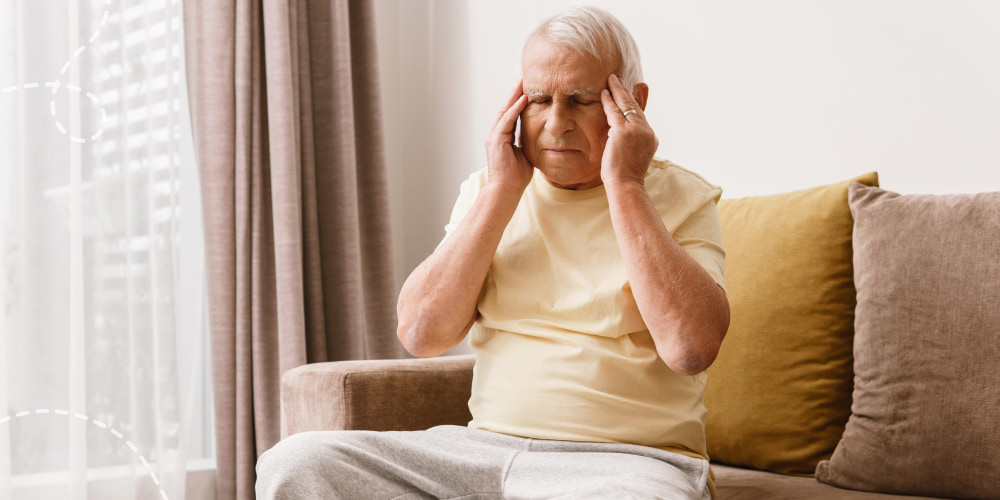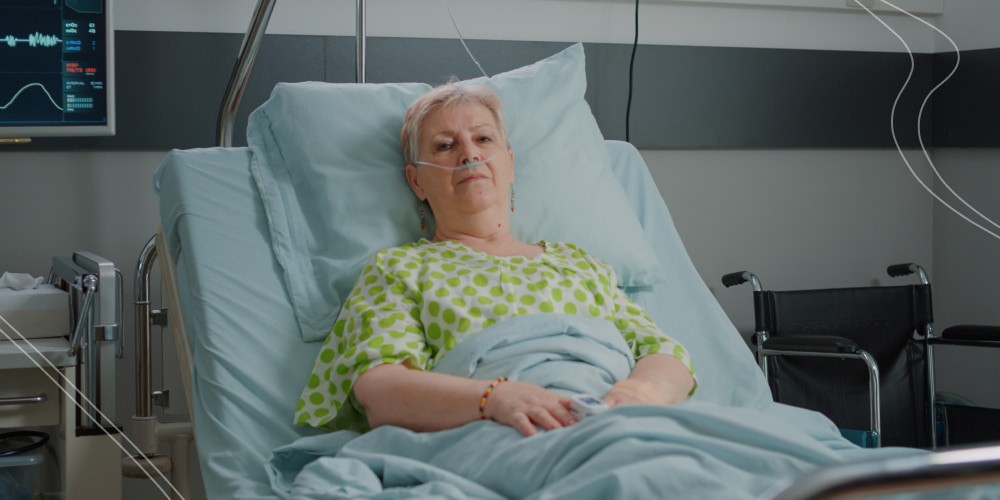Middle Cerebral Artery Stroke is a sharp disruption of the normal blood supply to the brain. By the nature of the disorders, there are two main types of stroke:
- ischemic (often called cerebral artery infarction);
- hemorrhagic (including subarachnoid hemorrhage).
The word ischemic literally means that the blood does not flow sufficiently to this or that organ. In such a stroke, blood does not flow to the brain due to blockage or severe narrowing of the major arteries. As a result, brain tissue cells die off.
Transient ischemic attacks (TIA) are defined clinically as rapidly emerging focal and less often diffuse disorders of the brain function caused by local ischemia, and disappear within no more than a day, for example, artery stroke.
The main risk factors for TIA include:
- age;
- arterial hypertension;
- hypercholesterolemia;
- atherosclerosis of the cerebral and precerebral (carotid and vertebral) arteries;
- smoking;
- heart disease, atrial fibrillation, myocardial infarction, left ventricular aneurysm, artificial heart valve;
- rheumatic heart valve disease;
- myocardiopathy;
- bacterial endocarditis;
- diabetes.
Symptoms of middle cerebral artery stroke
Cerebral infarction is almost never asymptomatic. You may have already come across actively disseminated reminders for the timely recognition of a stroke. It is very important to call an ambulance and provide the patient with medical care as soon as possible; the sooner help is provided, the less brain damage.
The main symptoms of middle cerebral artery stroke are:
- dizziness;
- loss of orientation in space;
- vomit;
- convulsions;
- impaired coordination, speech, vision, writing, reading, swallowing;
- the inability to move individual limbs and/or perform simple manipulations such as raising two hands at the same time, brushing teeth or flipping through the pages of a book.
The symptoms are extremely varied. They depend primarily on which part of the brain was deprived of blood supply, then exactly the function for which this area is responsible will be disrupted.
At the same time, all the symptoms do not appear; you may notice one or more, which is a good reason to call an ambulance immediately.
Pathogenesis of Middle Cerebral Artery Stroke
The pathogenesis of middle cerebral artery stroke is characterized by damage to small perforating arteries of the brain, hemodynamic and rheological disorders. The clinical outcome is mainly determined by the localization and rate of development of cerebral artery occlusion, the state of collateral circulation, and the rheological properties of the blood.
Clinical symptoms usually occur suddenly and reach their maximum degree within a few seconds or one to two minutes; they persist for 10-15 minutes, much less often for several hours.
Focal symptoms of brain damage and artery stroke are varied and are determined by the localization of cerebral ischemia. It often presents with mild neurological impairment:
- numbness of the face and hands,
- slight hemiparesis or monoparesis of the hand.
However, severe disorders of hemiplegia and total aphasia are also possible. There is often a short-term decrease in vision in one eye, which is caused by impaired blood circulation in the orbital artery. The stroke may recur frequently or occur only once or twice. Patients do not attach significant importance to transient short-term disorders and do not seek medical advice in many cases. Therefore it is difficult to assess the prevalence of this stroke. However, 30-40% of patients who underwent TIA develop middle cerebral artery stroke in the next five years. More than 20% of these strokes occur within the first month and almost half during the first year after the stroke. The risk of stroke is approximately 10% in the first year, followed by about 5% annually. The likelihood of developing a stroke is higher with repeated cases and increased patient age. The likelihood of a stroke increases by almost 1.5 times with an increase in age by ten years. The prognosis is slightly better when the stroke presents with only transient blindness in one eye. It is important to note that heart disease is the most common cause of this stroke culminating in death.
Middle cerebral artery stroke risk factors
The diagnostic is often established retrospectively on the basis of the history of the development of transient manifestations of focal brain damage in a patient with risk factors cerebrovascular accident. Differential diagnostic is carried out with other diseases manifested by transient neurological disorders:
- migraine;
- epileptic seizure;
- Meniere’s disease and lesser-like syndromes;
- multiple sclerosis;
- a brain tumor;
- hypoglycemia;
- fainting;
- drop attacks, etc.
Migraine
With migraine, short-term neurological disorders, migraine aura in the form of hemianesthesia, hemiparesis, aphasia, and unilateral visual impairment are possible. Which, in most cases, are accompanied by a typical headache attack. Migraine attacks usually start at a young age. Focal symptoms during a migraine aura usually develop more slowly over 20-30 minutes than with TIA and are often combined with visual disturbances typical of migraines.
Partial seizures
Partial seizures can present with transient motor, sensory, visual, or speech disorders that resemble TIAs. The spread of sensory and motor disorders along the limb is often observed; clonic seizures or a secondary generalized epileptic seizure may occur. EEG data can be of great importance, revealing changes characteristic of epilepsy.
Meniere’s disease
With Meniere’s disease, benign positional dizziness, and vestibular neuronitis, sudden dizziness occurs, often in combination with nausea and vomiting, which is also possible with TIA in the vertebrobasilar basin. However, in all these cases of vestibular vertigo, only horizontal or rotatory nystagmus is observed, and no symptoms of trunk involvement are noted. TIA in the vertebrobasilar system is rarely manifested only by isolated vestibular dizziness, but this should be considered in elderly patients with the risk factors.
Multiple sclerosis
At the onset of multiple sclerosis, transient neurological disorders resembling TIAs can be observed. Symptoms clinically indistinguishable from TIA are also possible with brain tumors and middle cerebral small intracerebral hemorrhages or subdural hematomas. In these cases, sometimes only the results of computed tomography or magnetic resonance imaging of the head can make a correct diagnosis.
Hypoglycemic conditions
Hypoglycemic conditions can give a clinical picture similar to artery stroke. In all cases, when a diabetic patient complains of transient neurological disorders, especially at night, upon awakening or after exercise, it is necessary to study the blood glucose level during such conditions.
Causes of middle cerebral artery stroke
In about 90-95% of cases it is caused by atherosclerosis of the cerebral and precerebral arteries, damage to the small cerebral arteries due to arterial hypertension, diabetes mellitus, or cardiogenic embolism. In more rare cases, they are due to:
- vasculitis;
- hematological diseases (erythremia, sickle cell anemia, thrombocythemia, leukemia);
- immunological disorders (antiphospholipid syndrome);
- venous thrombosis;
- dissection of the precerebral or cerebral arteries;
- migraine;
- in women taking oral contraceptives.
The most common cause of middle cerebral artery stroke is the movement of a blood clot along an artery and clogging it in a narrow place. A blood clot is a blood clot mainly made up of platelets.
- With normal vascular patency, platelets are responsible for blood clotting, but with atherosclerosis, cholesterol plaques form, narrowing the lumen of the artery;
- Because of this, the usual blood flow is disrupted, side vortices are formed, and platelets stick together into clots.
Also, the cause of the formation of a blood clot can be an increased level of sugar in the blood with it; microtraumas are formed in the artery walls due to an increase in blood density, which also disrupts normal blood flow.
The cause of a middle cerebral infarction can also be narrowing the lumen of a large artery by more than half. When the artery narrows, the blood supply to the brain does not completely stop; therefore, a person often experiences a so-called minor stroke. A minor stroke is similar in symptoms to a regular stroke. Although the damage is much less, this condition requires urgent medical attention. Further deterioration of the condition of the arteries can lead to a stroke with all its consequences.
Middle Cerebral Artery Stroke diagnostics
Patients who have undergone TIA require an examination to determine the cause of the transient ischemia of the middle cerebral to prevent acute stroke and other diseases of the cardiovascular system. Physical examination results can provide important information.
- The presence of arrhythmias, atrial fibrillation, and detection of a murmur in the heart suggests the cardioembolic nature of the stroke.
- A systolic murmur heard behind the angle of the mandible is a sign of stenosis of the internal or common carotid artery.
- An increase in the pulsation of the branches of the external carotid artery is possible with blockage or significant stenosis of the internal carotid artery on this side.
- A weakening or absence of pulse and a decrease in blood pressure indicate a stenosing lesion of the aortic arch and subclavian arteries
To find out the cause of the stroke, non-invasive ultrasound methods of vascular examination are used, among which the most informative are duplex scanning of the precerebral arteries of the head and transcranial Doppler ultrasonography of the cerebral arteries. Currently, magnetic resonance angiography and spiral computed angiography are increasingly developing to diagnose lesions of the precerebral and cerebral arteries. The survey plan includes
- a detailed general blood test;
- biochemical blood test with determination of cholesterol and its fractions;
- study of hemostasis;
- ECG.
If there is a suspicion of a cardioembolic genesis of the stroke, a consultation with a cardiologist and a more in-depth examination of the heart (echocardiography, Holter monitoring) are indicated. In cases of the unclear genesis of the stroke, in-depth studies of blood plasma are shown to determine coagulation factors and fibrinolysis, the level of lupus anticoagulant and anticardiolipin antibodies, etc. digital) to confirm the results of non-invasive ultrasound research methods and assess intracerebral circulation.
CT and MRI of the head in the middle cerebral artery stroke
CT or MRI of the head is desirable in all cases of middle cerebral artery stroke. Still, it is necessary in diagnostically unclear cases to exclude other possible causes of transient neurological disorders (brain tumor, minor intracerebral hemorrhage, traumatic subdural hematoma, etc.). In most patients with TIA or middle cerebral artery stroke, CT and MRI of the head do not reveal focal changes. Still, cerebral infarction is detected in 10-25% of cases (more often in cases where neurological disorders persisted for several hours).
Diagnostics is quite complex because a doctor will need a large amount of data to identify the cause and assess brain damage, and therefore the consequences of a stroke.
Depending on the situation, CT or MRI can be used to visualize the state of the cerebral vessels. A sufficiently informative study on the state of blood flow will be angiography, X-ray examination using a contrast agent injected into the vessels.
In addition, the doctor may prescribe a blood test, urine test, glucose test, cholesterol levels, and conduct an ultrasound examination.
Treatment and rehabilitation of middle cerebral artery stroke
The primary task in acute stroke is to save the patient and prevent the expansion of the area of brain damage. In the first hours after middle cerebral artery stroke, drug treatment is effective. Further, after a detailed diagnosis and visualization of the affected vessel area, surgical methods are used to remove the thrombus or plaque that caused the stroke.
Treatment can be roughly divided into three stages:
- ensuring the necessary functioning of the body and preventing the expansion of the area of brain damage in the phase of acute stroke (the first hours and days after the attack);
- elimination of the cause and minimization of the consequences of a stroke in the recovery phase;
- prevention of recurrent stroke.
No specialist can foresee in advance what consequences will be found in the body after a cerebral artery stroke. Indeed, the brain contains areas responsible for almost all vital processes. The recovery process after a stroke takes from several months to a year or more. Therefore, the main goal that the specialists of the neurological department set themselves is to take measures to minimize the negative consequences of stroke, taking into account the often elderly age of patients and to prevent relapse. For this, it is important to comprehensively manage the patient not by one attending physician but by a whole team of specialists with the involvement of colleagues from other departments, if necessary. Turning to specialists, you can be sure that a person in this difficult situation will be provided with all the necessary medical assistance to speed up brain functions. For this, specialists have developed a three-stage program for the rehabilitation of patients after ischemic stroke:
| Stage of work with a lying patient | Maintaining the work of vital body functions. |
| Early rehabilitation stage | Passive gymnastics, massage to restore basic functions until the patient gets out of bed. |
| Late rehabilitation stage | Gradual restoration of motor, mental, and other body functions affected by a stroke. |
At all stages of the program, a key principle is an individual approach to each patient. Stroke remains a hot topic for research. New rehabilitation methods, effective drugs, and treatment regimens appear regularly.
Prevention of middle cerebral artery stroke
A person cannot influence the movement of a blood clot through the vessels. Still, everyone can pay attention to several risk factors, exclude them if possible to prevent the formation of a blood clot, and minimize the risk.
- It is important to undergo a course of treatment and periodically check your condition with a doctor if there is a chronic disease such as diabetes mellitus, confirmed atherosclerosis, high blood pressure, various disorders in the work of the heart and blood vessels.
- Experts strongly recommend give up tobacco and alcohol.
- It is advisable to maintain an active lifestyle.
- You need to monitor your diet, not to allow a strong imbalance in the direction of fats and fast carbohydrates.
The above points are effective, proven in numerous studies, measures to prevent middle cerebral artery stroke, and many other diseases.
But there are also risk factors that cannot be influenced. Among risk factors are old age and heredity. If the next of kin have suffered a stroke, they have been found to have serious vascular disorders.
FAQ
- What happens to a person during a stroke?
Our brain, like all other organs, feeds on arterial blood enriched with oxygen. In case of damage or blockage of the cerebral vessels, the brain remains without power and reacts to this by the death of this area. With the lost part of the brain, a person loses those functions for which he was responsible.
- What complications can there be after a stroke?
Complications of a stroke can include sleep disturbances, confusion, depression, incontinence, atelectasis, pneumonia, and impaired swallowing, which can lead to aspiration, dehydration, or malnutrition.
- How long can a person live after a stroke?
More than 75% of patients survive for a year after the first stroke, and more than half survive for five years. People who have a middle cerebral artery stroke are much more likely to survive than those with a hemorrhagic stroke.
- What does a person feel before a stroke?
The general cerebral signs are drowsiness or agitation, a feeling of dullness, and sometimes a short-term loss of consciousness. An impending stroke may be accompanied by nausea or vomiting, headache, dizziness, fatigue, or tinnitus.













Please, leave your review
Write a comment: